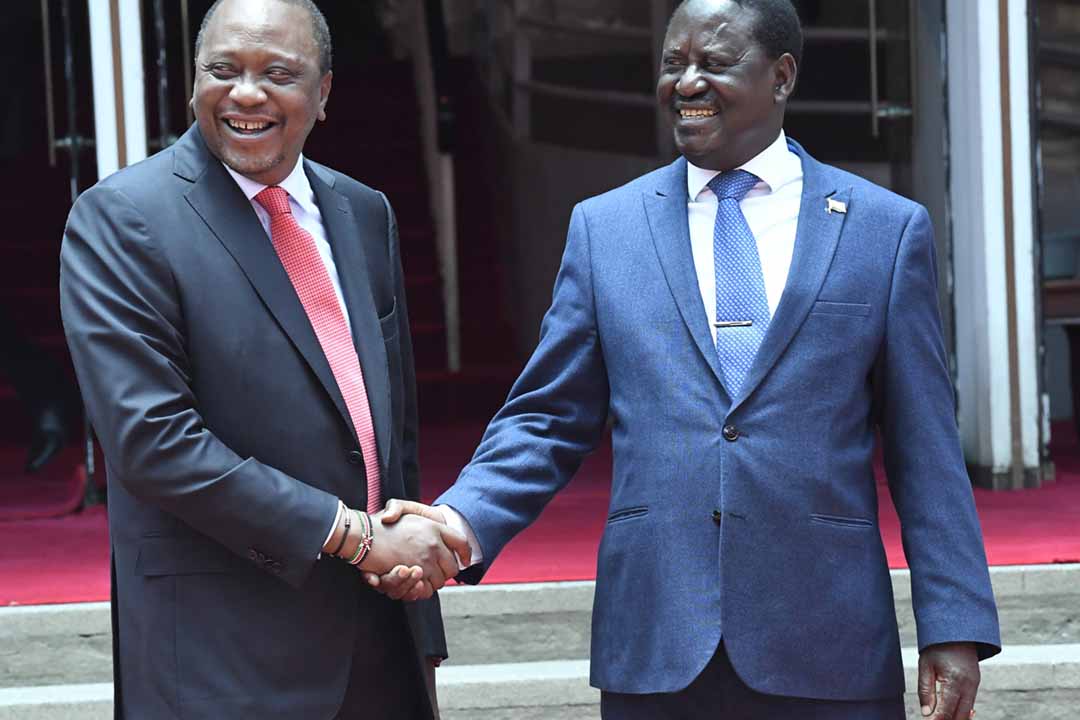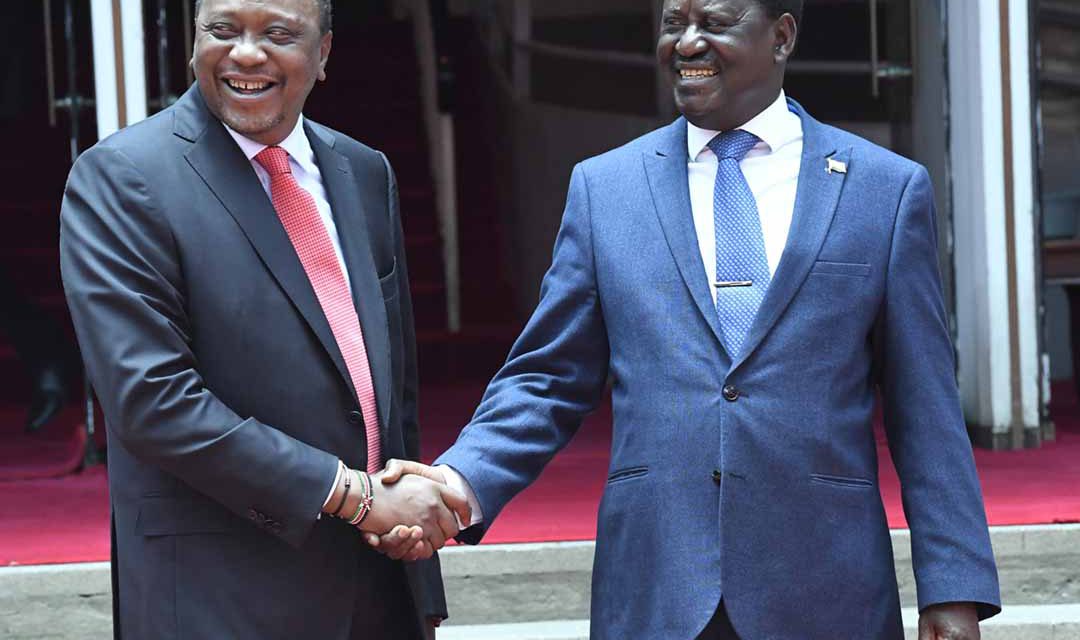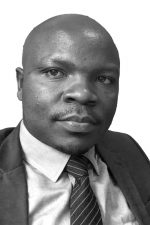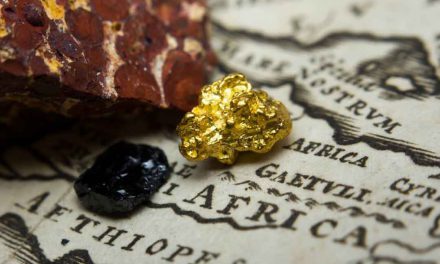
Kenya’s President Uhuru Kenyatta (L) shakes hands with the National Super Alliance (NASA) coalition opposition leader Raila Odinga after a news conference at the March 9, 2018 at Harambee house office in Nairobi. (Photo by SIMON MAINA / AFP)
Kenya: out with the old
On 6 February this year, Miguna Miguna, a Kenyan-born attorney and a solicitor in Canada tweeted that Kenya was in danger of becoming a Kenyatta-Moi private estate. “Patriots,” he added, would have to “mobilise” to stop the takeover of the country, by creating a “vibrant people-focused and merit-based society … built on the principles of social justice and governed by individuals of integrity”.
In an earlier tweet, Miguna had claimed that certain “Anglo-American imperialists” were working with Kenya’s opposition leader, Raila Odinga, to “mutilate the Constitution” with the aim of turning President Uhuru Kenyatta into a “theoretical monarch”. The social media posts expressed a widespread perception in the formally democratic country that its governance is currently threatened by a dynastic takeover, following a rapprochement between Kenyatta and Odinga, his erstwhile arch rival for the presidency, in March 2018.
Besides stimulating unity and numbing the opposition, critics say a widely publicised handshake between the two leaders created a platform for the germination of a form of dynastic politics that brings together the scions of Jomo Kenyatta and Jaramogi Oginga Odinga, the first president and first vice-president of Kenya, respectively. Kenyans had effectively been left “at the mercy” of the government following the handshake, Ayub Savula, a member of parliament told Africa in Fact in a telephone interview. The deal would “erode” the legislature’s oversight role in parliament, said Savula, who represents a district in western Kenya. “The democratic strides that Kenya has made since independence in 1963 will go to waste,” he added.
The engagement with Odinga was part of a long-term plan aimed at ensuring that “we develop a society that is politically inclusive”, Kenyatta said during a round-table interview with media houses at State House in Mombasa at the end of 2018. For his part, Odinga told the media in Nairobi on 28 December last year that “The Handshake”, as it has become known in Kenya, was the foundation of the unity and development of Kenya. Details of the agreement have not been made public.
Nandi County Governor Stephen Sang said in a phone interview that the rapprochement was contracted between two individuals who represented the private interests of two of Kenya’s rich and famous families, and that it was “not wholesome”. The politicians’ concerns reflected widespread perceptions among citizens of East Africa’s biggest economy that the country will be run by two individuals for their own gain. Many are now rallying behind the “Hustler Movement”, an amorphous grouping that supports Deputy President William Ruto.
Many Kenyans see Ruto – who worked as a kuku (chicken) seller to supplement his parents’ income while at school and went on to earn a doctorate in ecology from the University of Nairobi – as their emancipator. He is seen as a hardworking and aggressive politician who responds swiftly to their needs. The deputy president has pushed for the installation of electricity in businesses and homes under the Last Mile project, which seeks to supply every Kenyan home with electricity. He has overseen road construction projects and very visibly inspected them. Addressing residents of Tharaka Nithi County in June 2018, for instance, he bluntly told road contractors whose projects were behind schedule that they should try their hand at other businesses, “like roasting maize”, if they were unable to complete road construction.
Ruto has facilitated the installation of critical services such as renal units in health institutions across different parts of Kenya and shown a critical interest in the country’s agriculture. “Farmers must change with the times; they must embrace forms of agriculture whose returns are high and the market for produce readily available,” he told the African Green Revolution Forum in Kigali, Rwanda in September last year.
His energy and boldness in addressing issues that other politicians prefer to avoid or leave to the slow operations of a cumbersome bureaucracy has won him many supporters. Ruto’s frequent pronouncements on issues that affect people’s daily lives have “made the deputy president’s political star shine”, says Julius Bosire, a lecturer at the Jomo Kenyatta University of Agriculture and Technology.
“For a long time, Kenyan politics has been in the hands of leaders who lacked the balls to call things as they are,” Bosire told Africa in Fact. “Taxpayers’ money has been stolen, not merely by the million, but in billions, without principled opposition from many lawmakers. This lazy, hands-off leadership has made Kenya’s economic prospects nosedive, leaving Rwanda and Ethiopia on top.” Ruto’s apparently genuine interest in popular issues makes him virtually unique among Kenya’s current crop of senior political leaders, Bosire argued.
Ruto’s frequent visits to districts around Kenya keep him in touch with problems that affect citizens on the ground, said Amos Kirong, a political analyst in Nairobi. “He sees and feels what the common man goes through in a typical day, and offers solutions,” Kirong told Africa in Fact. “This has promoted dialogue between the government and members of the public. Public participation is a crucial component of our Constitution. It stimulates democracy because it provides the public with the opportunity to take part in critical decision-making processes in government.”
Public interest in participating in discussions around the national budget, public procurement and tendering, and the legislative process has grown in recent years, says Joseph Ole Lenku, the governor of Kajiado County. According to the governor, the region held more than 15 public forums between 28 May, 2018 and 3 June, 2018 in more than 50 locations to discuss the county’s 2018/2019 budgetary estimates. Kenyans now feel more able to question and appraise government claims and projects, and their experience of this has gradually changed their attitude to the question of accountability in particular, says Ole Lenku. Long accustomed to dynastic-style rule, with its entrenched secrecy, they have come to expect a more open approach to governance.
This, and Ruto’s demonstrated contact with “ordinary citizens”, has seen him faced with hostility from the establishment, whose leaders include the Kenyattas and the Odingas, as well as the families of former president Daniel arap Moi, who ruled for 24 years, and Musalia Mudavadi, a former deputy prime minister and vice president.
Moi senior’s son Gideon Moi is a polo player, senator and chairman of the Kenyan African National Union (KANU), which was the country’s ruling party for 40 years until its election loss in 2002. His brother, Raymond, is an MP.
The opposition leader, Raila Odinga, a former prime minister, is the son of Jaramogi Oginga Odinga, a former vice president. Raila’s elder brother is a member of the East African Legislative Assembly and a former nominated senator, assistant minister for finance and an MP. Mudavadi, a member of the opposition coalition, National Super Alliance (NASA), inherited the Sabatia parliamentary seat from his father, Moses Mudamba Mudavadi. He is said to be planning to run for the presidency in 2022.
The public demonstration of unity between two members of two of the country’s major political dynasties has sparked fears among ordinary citizens that the country will return to the days when national resources were unfairly distributed and tribalism was rampant in the award of public offices. To many, Ruto represents the advent of a “hustler era” in which the country’s political offices will be more open to people without a privileged background.
Dynasties are not a uniquely African or a Kenyan phenomon, says Godfrey Sang, a political analyst based in Nairobi. He points to the Bush family in the US, the Trudeaus in Canada and the Nehru-Gandhi dynasty in India. But, he argues, that Kenyan dynasties have limited interest in, or tolerance for, democracy and often seek to block opportunities for lesser-known candidates of greater merit. This approach is “a form of birth-based exclusion that is antithetical to democracy,” he adds.
Faced with Ruto’s apparently unstoppable rise to influence, proxies of political dynasties have come up with a plan to prevent him from succeeding President Kenyatta in 2022. In 2013, President Kenyatta and Deputy President Ruto entered into an agreement that promised the former a two-term presidency of five years, which would expire in 2022. After this, Ruto would be the Jubilee Party’s candidate to run for president for the years from 2022 until 2032.
Central Organisation of Trade Unions Secretary General Francis Atwoli has told audiences at several barazas (public meetings) and media interviews that the Constitution should be amended to allow Kenyatta to continue as president after 2022, arguing that he “has much to offer” the country. Senator Irungu Kang’ata has also said that the president will be “too young to retire” by the time he concludes his constitutionally mandated terms. And in February this year, the former vice chairman of the Jubilee Party, David Murathe, claimed at a meeting of leaders of the Kamba people at Kalonzo Musyoka’s Yatta farm that “no law bars President Kenyatta [from] serving as deputy to another president”.
However, in the same month, President Kenyatta said he would not be running for any political seat after 2022. Speaking as he left for a meeting of the East African Community summit in Arusha, Tanzania, he called on Kenyan leaders to discard politics that had “no impact on the lives of Kenyans”. But the apparent indirect reference to Ruto’s popular connection with citizens, which is in such contrast with many of his peers in Kenyan politics, and the implicit claim that establishment leaders could co-opt it for their own purposes, wasn’t lost on commentators.
“Whichever way you look at it, we are not about to change our mindset; we will support one of our own, son of a pauper, to be Kenya’s president in 2022,” says Didmus Barasa, an MP for Kimilili, western Kenya. Like many of his fellow citizens, Barasa feels that a Ruto presidency will free Kenyans of the archaic leadership of dynasties.
Kenya’s decades of dynastic politics have constrained citizens’s capacities to contribute to public debate. Above all, its dynastic rulers have never tolerated ideas that deviated from their own. To many Kenyans, the new “hustler era” holds out the promise of a new and more open democratic space in which the role of the government is to focus on issues that affect ordinary citizens.
Mark Kapchanga is a senior economics writer for the Standard newspaper
in Kenya and a columnist for the Global Times, an English-language newspaper
in China. He is pursuing a PhD in investigative business journalism at the
University of Nairobi.












